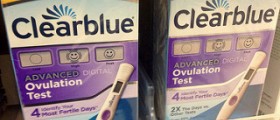No I don't. You can only get pregnant in your fertile days. If it wasn't in your 'fertile' time there is no possibility of pregnancy. Even if sperm enters your vagina at a fertile time, there is no guarantee you will get pregnant. Many women try to get pregnant and cannot. Many get pregnant the first time they have sex. As Lizardqueen says stress can delay your period.
Loading...
Very unlikely that you will get pregnant. The stress is probably delaying your period for some unknown medical reason that will never have a cause or reason. It takes ejaculation or medical help to get pregnant at your fertile time to get pregnant and then a lot of times trying more than one time to get pregnant for most females - I know I am one of them, it took me many years. So you are fine, just remember to use condoms or birth control of some kind of you are not ready to have kids yet cuz if you play with fire? Natural consequence is you WILL get burnt, meaning you will get pregnant eventually.
Loading...
Wait. I'd like to just confirm it. So if im gonna do that sex when im not on my fertile days, though he ejaculated inside me, i wond get pregnant? Or still, he needs to do it outside though im not fertile?
One more thing, i would really like to thank you for all the responses. I did appreciate it a lot and read it a lot of times and reflected about it. I have my period now. Thank youuuu! May i know where you from?
Loading...
I'd like to thank you, too. Your information had helped me a lot and did make me worry less. I have already my period now. It really maybe because of being worried thats why it got delayed. I just wanna ask if im gonna use birth pills, what could be the side effects in me? Internal and external. And will that still make me pregnant in the future?
Loading...
Maybe go with the flow if it comes then let it be cause it's a blessing from our Lord Jesus Christ. Are you married or not?
Loading...
You can only get pregnant when sperm enters your vagina in your fertile days. The problem is that you cannot be 100% certain when those days are. With a very regular cycle you can be reasonably certain when those days are, and then allow a couple of days either side, But for various reasons ovulation can occur at different times. Your last cycle was a week longer than usual. It may be partly due to stress, but it may also be that you ovulated a week later than was expected. Equally you could ovulate early. Then days calculated to be non-fertile would actually be fertile days. Also, pre-cum can contain sperm, so withdrawal before ejaculation is not safe. Some UK research has indicated that for some men, there is always sperm in their pre-cum. The possibility of STIs needs to be considered also.
The risk of pregnancy is not the only factor to be considered with sexual intercourse. Sexual intercourse is more than an intimate experience; it is a bonding action, and the more you engage in that, the more you are bonded. That is why it is so important to be a frequent activity in marriage.
I am glad your period has arrived, and that you appreciated the responses.
I am from the UK.
Loading...
Not yet married. Still in college. And this was my first time doing this. And i really got bothere and worried that i was delayed. I panicked at the possibility that i would get pregnant. But both of us decided that if it will turn out like that, we will continue it.
Loading...
Thank you, again. You were the first person who responded. Beforw then, i thought no one would respond on my topic. Then, a notification popped up. Thank God! Can i still ask you more about this thing? Cause i know you obviously think that i am not familiar with this. If ever we are gonna do that again. I would like to take pills. How should i take them? Before doing intercourse, how long should i take the pills?
Loading...
Please feel free to ask whatever you like.
Each contraceptive pill has its own guidance, and that guidance should be heeded. I would recommended using a back-up method of birth control until you’ve completed your first pack or before starting having sexual intercourse. The pills then have to be taken daily. Check the side effects, and check you have no medical condition that would mean you shouldn't take them
However I always recommend waiting until marriage as sexual intercourse is a bonding activity and can impact on the eventual marriage. Also your 'Thank God' indicates a spiritual association, and it may well be against your moral code. I hope that answers your question. If I did not understand you correctly, ask again
Loading...
You have answered it the way i want it to be. It is just that i didnt undertand the 2nd paragraph. About the back-up method.
Loading...
Because the pill might not be as effective in 1st month, a condom, for example, could be used as a back-up.
Loading...
Loading...
If you have sexual intercourse at any time, there is the possibility of pregnancy following.
[1] The chances of pregnancy are lower during the period flow. Usually it is not a fertile time, and the period flow is likely to flush out any egg that might be there. But that means ovulation would have taken place just a short while previously, and only 2 weeks after the previous one. But that does happen sometimes
[2] It is certainly NOT true that "5 days after that ... you are safe". It all depends on when you ovulate and the length of your period. With the typical 28-day cycle ovulation would be expected to take place Cycle Day 15. That would mean you would probably be fertile CD10-CD15. A typical period lasts 5 days (CD1-CD5). 5 days after the end of the period is CD10 - the first 'fertile' day. But the period could have lasted 6 days, or the cycle could be less than 28 days. Nevertheless, however regular you are, there is always the chance that one time could be different.
Ovulation is not directly related to your previous period; rather your next period is related to ovulation. Cycle Days are counted from the start of a period as that is the only clearly known event date.
I hope this clarifies
Loading...
I somehow did not get it, honestly. It is hard for me. I can hardly understand almost everything. About ovulation not being precise. I dont get it.
Loading...
Ovulation is precise. It is the timing that is difficult to be certain about. I'll try and explain again, but try not to get too technical and keep it simple.
A menstrual (monthly) cycle is, by convention, counted from the first day of your period, mainly because that is usually an easily noted event. Your period is the part of the menstrual (monthly) cycle when you bleed from your vagina for a few days. On average, and very often, this happens every 28 days. However the range of days is commonly from 24 to 35 days. But some are outside that range. Some only have a period a few times a year. Some women are very regular; exactly the same days for each month's cycle. Some vary a day or two either way month by month.
So each menstrual (monthly) cycle starts on the first day of your period (Cycle Day 1) and lasts until the day before your next period starts.
Your body produces different amounts of hormones at different times during your menstrual cycle. Rising oestrogen causes an egg to develop and to be released by one of your ovaries. This is known as ovulation, and the egg lives for about 24 hours. You can't get pregnant if you don't ovulate. In preparation for a possible pregnancy, your womb lining then thickens.
The egg travels down the fallopian tube and if it meets a sperm and is fertilised, a pregnancy can occur. If not fertilised, it will be absorbed into your body. The prepared womb lining comes away and leaves your body through your vagina, mixed with blood. This is your period, your menstrual (monthly) flow - or menses - and happens about a fortnight after ovulation (egg release). So your period is linked to when you ovulate. If you ovulate two days earlier than expected, your period is likely to start two days earlier than expected. If you ovulate two days later than expected, your period is likely to start two days later than expected.
The length of the period is on average 5 days, but is often a day or two longer or shorter for some.
Your fertile time (when you can get pregnant) is around the time you ovulate, As sperm can live for 5 or 6 days in a woman's body, they can arrive and wait in the fallopian tubes for up to five days. So if you ovulate today, the released egg could be fertilised by sperm that arrived from sex 5 days ago.
I hope this helps.
Loading...















